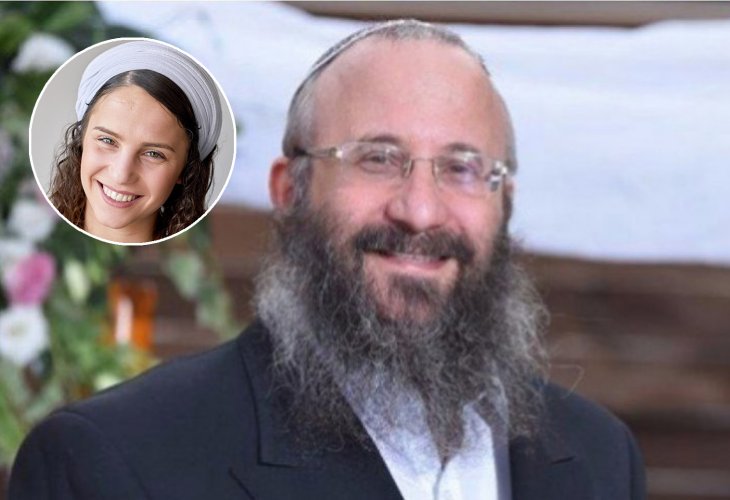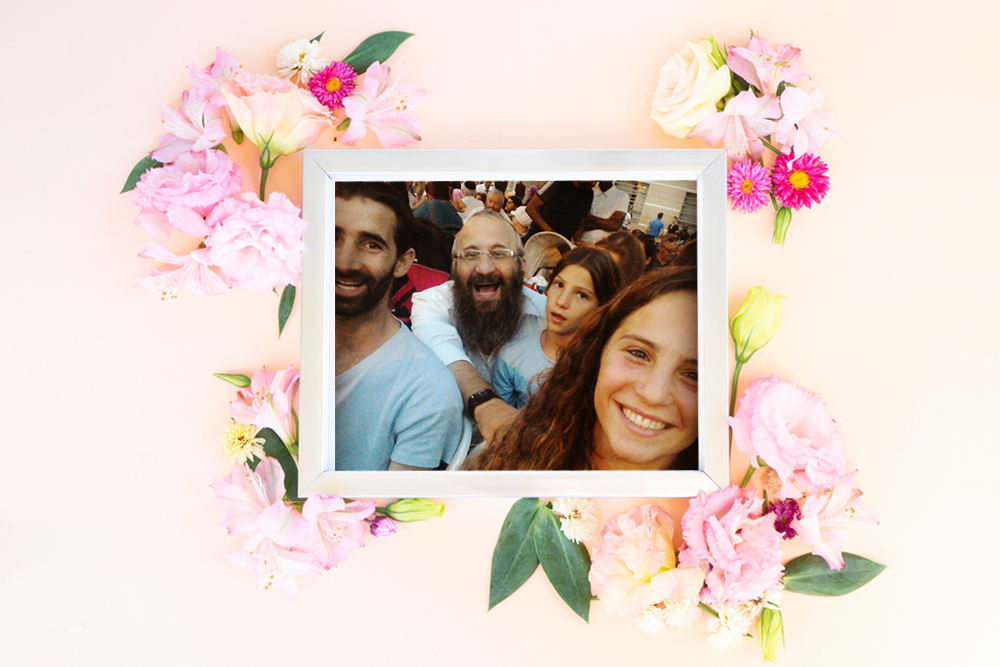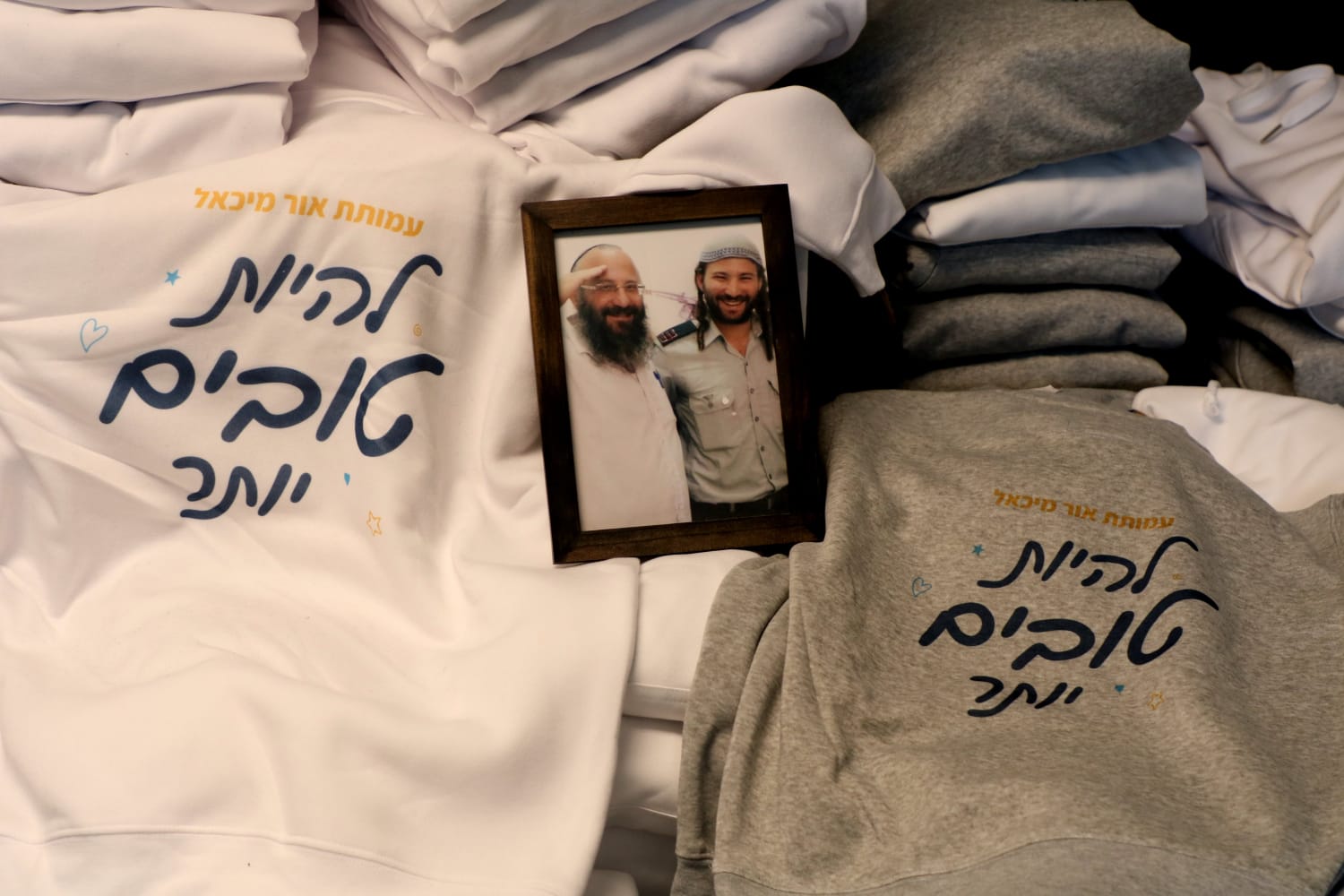Personal Stories
When Pain Becomes Purpose: How Orit Ettinger Transformed Grief Into a Lifeline for Others
After losing her father in a brutal shooting attack, Orit chose to heal others — accompanying patients, spreading warmth in hospitals, and continuing her father’s legacy of goodness
 (In circle: Orit Mark)
(In circle: Orit Mark)The liveliness and joy in Orit Ettinger’s voice can be heard clearly, even over the phone. “I have a busy day,” she tells me at the very beginning of our conversation. “You know how it is — studies, work, volunteering as director of a nonprofit, everything the home requires from me as a married woman, and above all my baby son, Tzur Shachar, who needs a lot of attention. But our phone call comes before everything else,” she emphasizes.
Many people remember Orit from the horrific terror attack in which her father, Rabbi Michael Mark, was murdered, her mother was critically wounded, and her younger brothers were also injured.
Orit was only seventeen at the time, and, as she says, her life changed 180 degrees — in every possible way.
“I Never Imagined Terror Would Reach Us”
The attack is burned into Israel’s collective memory. “Even today, people recognize me on the street from the photos that were published during the shivah,” Orit shares.
“They ask, ‘Are you Orit? How is your mother? How is your family?’
You can really feel that Am Yisrael hasn’t stopped thinking about us. It warms the heart.”
"The attack still affects us constantly. It changed everything. Nothing remained the same.”
Where Were You When It Happened?
“It was a Friday — the first day of summer vacation. There was this huge feeling of freedom. That morning, I went with my parents and little sister to Be’er Sheva for a driving lesson. Afterwards we returned home, and I went to give chocolates to soldiers for Shabbat.
“When I came home, I saw my parents getting ready to go away for Shabbat. They hadn’t planned to travel, but they got a sudden call that the brother who was supposed to stay with our grandmother couldn’t come. Since my grandfather had passed away a few years earlier and they never left my grandmother alone, they took two of my younger brothers and went.”
Orit explains that they are a family of ten children; she is the sixth, with four younger siblings. “I stayed at home with my two younger sisters. The plan was to spend Shabbat with our aunt and uncle who live in the community.”
But shortly before Shabbat, her uncle suddenly appeared at the house. “He asked who was home, and I said just me and my two younger sisters. He already knew there had been an attack, but he didn’t tell me anything — he just said, ‘Come with me.’”
“Your Car Was Shot… Your Parents Are Not Doing Well”
“We followed him, carrying our Shabbat clothes. We reached my aunt and uncle’s house, sat in the living room, and still no one said anything.
“People began walking in, looking at us, and leaving. After about ten minutes, my aunt took me aside and said:
‘Orit, there was a shooting attack. They shot at your family’s car. Your father and mother are in very bad condition.’”
Did you understand what that meant?
“Not really. I didn’t grasp the full meaning, but the word ‘terror attack’ wasn’t foreign to me. I had a cousin murdered in an attack in Jerusalem, my sister-in-law’s father was also murdered in an attack, and just a short time before ours, Dafna Meir was murdered at her doorstep in Otniel — only two houses away.
“As someone living in Judea and Samaria, terror was not something distant. But I simply couldn’t fathom that this time it was my family.
It felt impossible.”
“I remember hugging my two little sisters tightly and sitting next to them. A lot of people came, but for me it was like it was just the three of us. My whole world.
“I overheard phone conversations and realized my father had been murdered, my mother critically injured, and my brothers wounded.
Every moment brought a new painful detail. I felt utter chaos.”
How Did You Get Through That Shabbat?
“We all went to the hospital to be with my injured brothers and with my mother. It was unbelievably hard, but being together gave us strength.
“I remember the huge hug from my oldest brother Shlomi when I arrived — my first moment of feeling someone giving me strength, reminding me I’m not alone.”
“That Friday night we all sat and cried. At one point, Shlomi stood up to make Kiddush. Instinctively, I grabbed his hand and said:
‘You’re not doing it. You’re not replacing Abba.’ I couldn’t bear the thought of Kiddush without him…”
“We Must Restore Deterrence”
When Orit hears of new terror attacks, she thinks first and foremost about the families.
“They have no idea how endless their struggle is going to be. Even after five and a half years, nothing really heals. The emptiness remains. We continue living because we must, but it’s hard and complicated.”
“For example, my son’s brit milah took place on the same day as my father’s memorial service. We went straight from the memorial to the brit. A mixture of joy and deep pain.”
Helping Other Bereaved Families
“I often go to comfort families after attacks. There are many cases where I’m asked to come, and I usually agree. I’ve been in dozens of such situations.
“I usually sit quietly on the side, without speaking. I know it’s their space, their grief. Sometimes all you can do is be there.”
How Can Terror Be Prevented?
“Deterrence is essential. The terrorist who murdered my father went to court and said: ‘I’m only sorry I didn’t murder the wife and kids too.’ And he’s still receiving excellent conditions in prison.
“Terrorists today know they have nothing to lose. They kill, go to prison, their families get money and honor. Why wouldn’t they do it?
“This must change.”
What Does Real Deterrence Look Like?
“To me, deterrence means demolishing the terrorist’s home — and even that doesn’t always happen.
“And beyond that: expel the entire family. If your father is a murderer, you have no place among us. Go anywhere else — just not Israel.
“And everyone who cooperated must receive the maximum punishment.”

Continuing Her Father’s Light
When Orit speaks about her father, admiration fills her voice. “Abba had infinite goodness, and he was a great Torah scholar with tremendous knowledge. He always supported our family materially while my mother raised us.
“He always said he would retire at 40 — and he did. After his 40th birthday, he quit his job and worked only one day a week; the rest of the time he learned Torah and Kabbalah.”
“He wasn’t a dreamer — he executed everything immediately. If he decided on a vacation, we left that minute. If he wanted to fund a Torah project, it happened.”
Their last conversation, moments before he left on the drive where he was killed, was about the vacation cabins he’d booked for them. “He was my compass. I knew he would always guide me — shake me if needed. So many of his sentences are engraved in my heart.”
The “Or Michael” Nonprofit
The unforgettable memories of her father led Orit to establish the nonprofit “Or Michael” (Michael’s Light), which assists hospital patients.
“I’m the CEO,” she says modestly. “I’ve been managing it completely on my own for four years.”
“I saw so much loneliness in hospitals during my mother’s long recovery. I would sit by her bed while endless family and friends came to support us — and next to her lay a woman completely alone.
“I felt the hospitals lacked light.
And I said: the light my father brought to the world — that’s exactly what’s missing there. So I decided to bring his light into the hospital.”
Her Philosophy: Everyone Has Unique Light
“My father always taught that each of us has our own unique light. If I try to be like you, I’ll fail, because I don’t have your gifts. And you can’t be me either.
“When each person brings their light, the world gets the best possible version of them.”
This philosophy guides the nonprofit: “No acceptance criteria. Anyone can volunteer — musicians, energetic teens, quiet girls who simply sit and listen. We have over 1,000 volunteers visiting hospitals nationwide, and we also set up street stations to give out chocolates and lift spirits. The goal is simple: bring light to people’s day.”

“It’s Not Easy — But the Light Gives Strength”
“It’s obviously hard and painful to encounter suffering all the time. Two years and nine months ago my oldest brother Shlomi was killed in a car accident.
“We sat shiva in my home, and I felt like I couldn’t get up again.
How much can one family lose?
“At that moment I got messages from our volunteers telling me they set up a blood-donation and chocolate-distribution station at the entrance to Jerusalem in his memory.
“It filled my heart. I told myself: ‘Look at how much light continues in the world because of this mission.’”
“Of course it’s sad. We miss Abba terribly. Every time we see his picture, we feel the longing. But we try to look forward, be strong, and stay happy — because we know that’s what he would want.”

